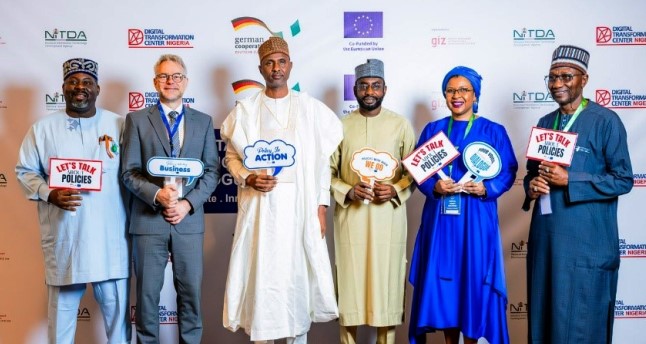The National Information Technology Development Agency (NITDA), in collaboration with the Digital Transformation Center (DTC) Nigeria and Deutsche Gesellschaft für Internationale Zusammenarbeit (GIZ), recently organized a two-day event titled “Digital Policy Dialogue: Cooperate. Innovate.” The event aimed to engage stakeholders in the Participatory Policy Implementation Framework (PPIF), emphasizing the importance of citizen involvement in policy development and implementation.
RELATED: NITDA partners with World Bank and WTO to drive Nigeria’s digital economy transformation
NITDA’s Director General, Kashifu Inuwa Abdullahi, highlighted that the PPIF focuses on fostering ownership and accountability by involving citizens in the policy-making process. He emphasized that this initiative marks a significant shift from previous top-down approaches, promoting a collaborative framework that includes co-design and co-creation.
The event underscored NITDA’s ongoing efforts to bridge the gap between government and citizens, ensuring that technological advancements benefit all. Abdullahi commended GIZ for their support, noting that the partnership has been instrumental in developing key initiatives like the Nigerian Startup Act and the National Digital Literacy Framework (NDLF). These initiatives have seen active participation from various sectors, including the creative industry, which is now championing digital literacy in Nigeria.
In a bid to enhance digital skills, NITDA is collaborating with the National Youth Service Corps (NYSC) and the Ministry of Education to train citizens across Nigeria’s 774 local governments. This effort aligns with the Ministry of Communications, Innovation, and Digital Economy’s targets of achieving 95% digital literacy by 2030 and 70% by 2027.
Abdullahi noted that GIZ and DTC are working to formalize the PPIF, aiming for broader applications beyond the digital sector, including education, agriculture, and healthcare. This framework includes initiatives such as multi-channel stakeholder engagement, collaborative decision-making via digital platforms, transparency, accountability, capacity building, and robust monitoring and evaluation mechanisms.
The Permanent Secretary of the Ministry of Communications, Innovations, and Digital Economy, Engineer Faruk Yusuf Yabo, highlighted that the initiative is supported by international partners, including the European Union and the German government. This collaboration marks a commitment to inclusivity and transparency in Nigeria’s digital policy development.
Dr. Markus Wauschkuhn, Coordinator of the Sustainable Economic Development Cluster (SEDEC) GIZ Nigeria, and Dr. Thwueba Dwani, Head of the Digital Transformation Center (DTC) Nigeria, emphasized the critical role of stakeholder engagement in ensuring sustainable and relevant policy outcomes. They introduced the PPIF as a vital tool for Nigeria’s digital innovation ecosystem, developed through extensive stakeholder engagement.
Representatives from various agencies, including the National Council for Arts and Culture (NCAC), the Small and Medium Enterprises Development Agency of Nigeria (SMEDAN), the National Office for Technology Acquisition and Promotion (NOTAP), civil society organizations, the private sector, and other stakeholders, also attended the event.
































